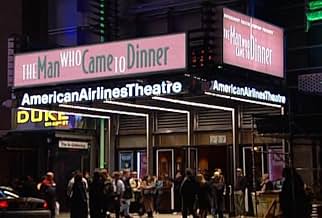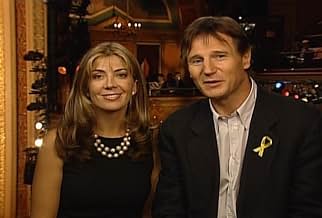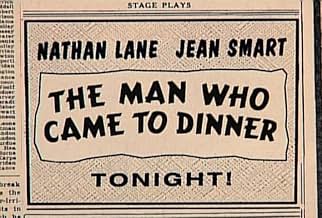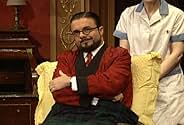Agrega una trama en tu idiomaCantankerous theatre critic Sheridan Whiteside falls on an icy sidewalk, breaks his hip, and is temporarily stranded at the Ohio home of Richard Stanley and his family. While he's there, Whi... Leer todoCantankerous theatre critic Sheridan Whiteside falls on an icy sidewalk, breaks his hip, and is temporarily stranded at the Ohio home of Richard Stanley and his family. While he's there, Whiteside turns life upside-down for everyone.Cantankerous theatre critic Sheridan Whiteside falls on an icy sidewalk, breaks his hip, and is temporarily stranded at the Ohio home of Richard Stanley and his family. While he's there, Whiteside turns life upside-down for everyone.
- Dirección
- Guionistas
- Elenco
Harriet Sansom Harris
- Maggie Cutler
- (as Harriet Harris)
Jeff Hayenga
- John
- (as Jeffrey Hayenga)
- Dirección
- Guionistas
- Todo el elenco y el equipo
- Producción, taquilla y más en IMDbPro
Opiniones destacadas
What a wonderful, witty comedy this is. I was so glad PBS broadcasted this terrific stage production. Beautifully directed by Jerry Zaks. I loved all the performances, but Jean Smart was especially fabulous as the ridiculous Lorraine Sheldon. The dialogue in this play is so good that even if you don't get an opportunity to see it, you'll get a good chuckle out of reading the script.
As someone who goes out of his way to see performances of "The Man Who Came to Dinner"--one of the greatest comic concoctions of the 20th century--I thought this was the best media presentation of the play to date, much better than the 1940 film version. My only quibble concerns the decision to pattern Lewis Stadlen's Banjo after Jimmy Durante's version in the film, rather than Harpo Marx (upon whom the character was originally modelled), but that's a matter of personal taste. (And to be fair, Stadlen does just fine, perhaps even out-Duranting Durante.) Conversely, I can't imagine anyone better in the title role than Nathan Lane, and he lives up to my hopes splendidly. (I hope PBS broadcasts him in "The Producers" one of these days!)
If you're in a mood to laugh yourself silly, this is the play for you. Nathan Lane is at his scenery-chewing best as Sheridan Whiteside (modeled on Alexander Woolcott), a critic, commentator, and friend of the great and near-great who is forced to spend several weeks in the home of a Middle America family for whom "Goodbye Mister Chips" is as high on the cultural scale as they go. Lewis Stadlen is equally hilarious as the manic, irrepressible Banjo (a takeoff of one of the Marx Brothers, but I'm not sure which). Jean Smart is wonderful as the haughty and man-eating Lorraine Sheldon, and Harriet Harris is superb as Maggie Cutler, Whiteside's devoted secretary and Lorraine's nemesis.
To get all the references, you'll need a copy of Who Was Who in Theater, Film, and Opera, but I'm glad they didn't try to update them. It just wouldn't have worked.
Finally, kudos to Ryan Shively (as Sandy, union organizer and June's fiancee)! A talented actor and an all-around great guy (okay, he's my roommate, so I'm a little biased)!
To get all the references, you'll need a copy of Who Was Who in Theater, Film, and Opera, but I'm glad they didn't try to update them. It just wouldn't have worked.
Finally, kudos to Ryan Shively (as Sandy, union organizer and June's fiancee)! A talented actor and an all-around great guy (okay, he's my roommate, so I'm a little biased)!
I enjoyed the taped stage play setting and all of the characters were immediately familiar to me, having just viewed the 1942 version. I rarely miss anything that Nathan Lane does and thought him perfect casting as Sheridan Whiteside.
However...it all seemed a bit forced to me. Lane's delivery was good and his mugging very funny, but he was working all the time. It just didn't seem to come naturally. The "Banjo" character was just an impersonation of Durante and an average one at that. As with the '42 film, I feel this character was superfluous.
The overall impression for me was one of a very good amateur company doing their very best to put on a show. I never forgot it was a play, whereas in the '42 version, I got more involved in the story.
As for the inter-act comments from the host and hostess, I skipped those immediately (so grateful for DVD technology!). The newsreel footage and swing music were delightful between the acts, though.
However...it all seemed a bit forced to me. Lane's delivery was good and his mugging very funny, but he was working all the time. It just didn't seem to come naturally. The "Banjo" character was just an impersonation of Durante and an average one at that. As with the '42 film, I feel this character was superfluous.
The overall impression for me was one of a very good amateur company doing their very best to put on a show. I never forgot it was a play, whereas in the '42 version, I got more involved in the story.
As for the inter-act comments from the host and hostess, I skipped those immediately (so grateful for DVD technology!). The newsreel footage and swing music were delightful between the acts, though.
We were unable to get tickets for this show while in NYC on vacation this summer, so it was a pure delight to have live Broadway brought into our home! We can only hope for more productions of a similar nature!!
¿Sabías que…?
- TriviaThe part of Banjo was originally based on Alexander Woollcott's good friend, Harpo Marx. However, in this production, the character is blatantly patterned after Jimmy Durante, who played the role in the 1942 film adaptation.
- Citas
Sheridan Whiteside: I may vomit.
- ConexionesReferenced in My Boys: Free Agent (2006)
Selecciones populares
Inicia sesión para calificar y agrega a la lista de videos para obtener recomendaciones personalizadas
Detalles
- Fecha de lanzamiento
- País de origen
- Idioma
- Locaciones de filmación
- Nueva York, Nueva York, Estados Unidos(American Airlines Theater)
- Productoras
- Ver más créditos de la compañía en IMDbPro
Contribuir a esta página
Sugiere una edición o agrega el contenido que falta

Principales brechas de datos
What is the Spanish language plot outline for The Man Who Came to Dinner (2000)?
Responda




























